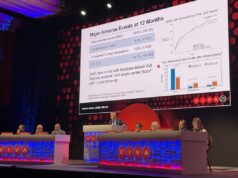
Three-year data from the LIFE-BTK randomised controlled trial, presented today at the 2025 Vascular Interventional Advances (VIVA) conference (2–5 November, Las Vegas, USA), demonstrate the prolonged efficacy and safety of the Esprit BTK drug-eluting resorbable scaffold (DRS; Abbott) in chronic limb-threatening ischaemia (CLTI).
Sahil Parikh (Columbia University Irving Medical Center, New York, USA) reported that, at three years, Esprit BTK demonstrated a 33% relative improvement in the composite primary efficacy endpoint of primary patency and limb salvage compared to percutaneous transluminal angioplasty (PTA; 59.5% vs. 44.8%; p=0.0025 log rank test).
Parikh added that the Esprit BTK was also associated with significantly lower rates of binary restenosis (38% vs. 49%; p=0.018 log rank test), and lower clinically driven target lesion revascularisation (CD-TLR) rates, though the latter did not reach statistical significance (10.2% vs. 18.4%; p=0.052 log rank test).
Furthermore, the presenter shared that safety outcomes, the composite of freedom from major adverse limb events at three years, and perioperative death at 30 days were similar between the two arms (90.8% vs. 94.2%; p=0.23 log rank test).
Parikh also outlined the findings of subgroup analyses. These showed that the efficacy of the Esprit BTK was consistent across most patient and lesion subgroups; however, significantly greater benefit was observed in patients with Rutherford-Becker class 4 disease and those not requiring inflow lesion treatment. Additional trends favouring the Esprit BTK emerged in patients with none or mild calcification, mixed wound aetiology, ‘Other’ race, and in those treated outside the USA.
“These findings support DRS as a durable, effective endovascular treatment option for long-term vessel preparation and reduced need for reintervention in CLTI,” Parikh concluded.













